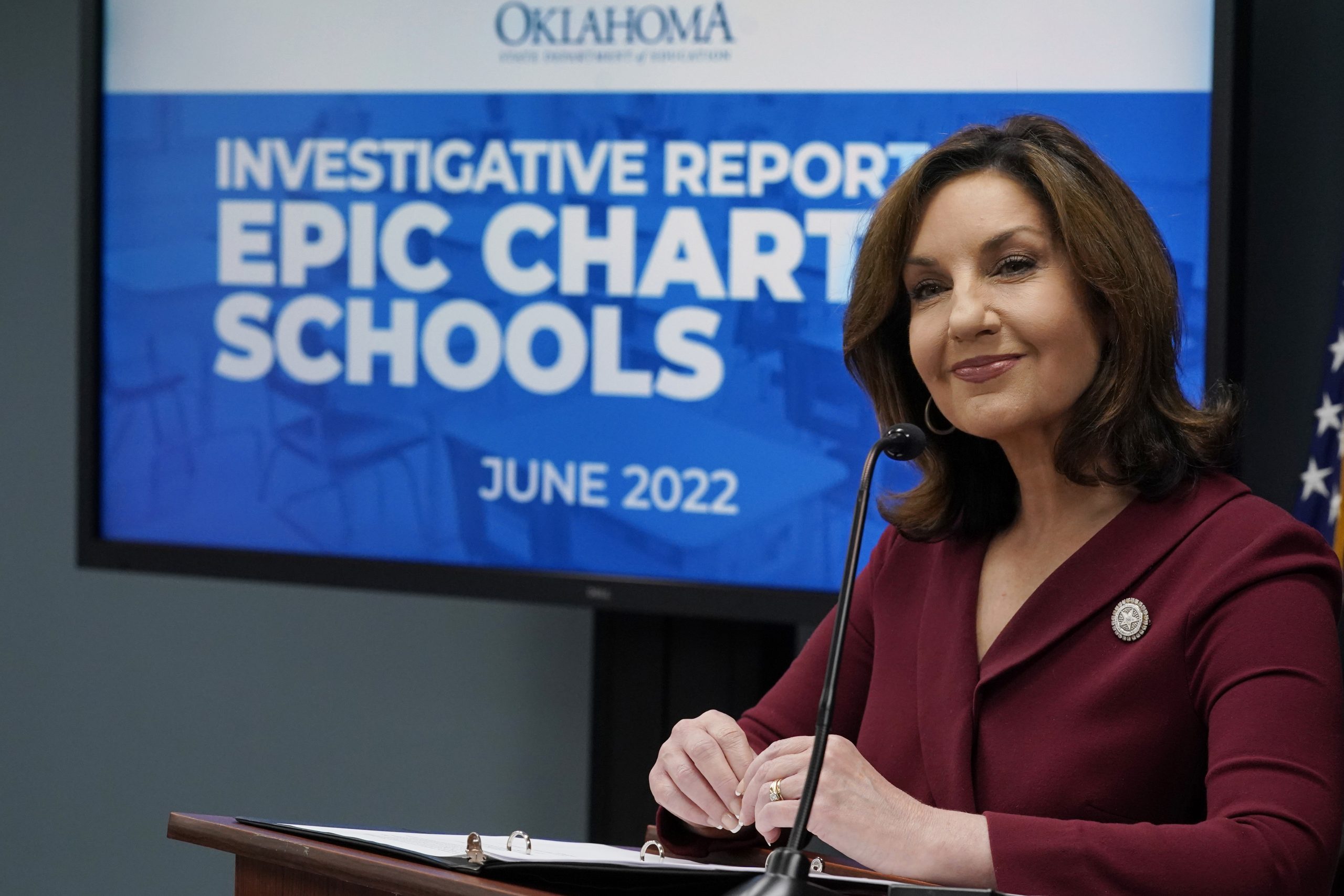EXCLUSIVE — Joy Hofmeister, the Democratic Oklahoma gubernatorial nominee and superintendent of public instruction in the Sooner State, pocketed campaign donations from an Education Department lawyer who brushed off the idea that she may have “violated” state laws, records show.
On Thursday, the Oklahoma Education Department removed links on Hofmeister’s official page to her campaign’s social media accounts after a Washington Examiner report quoted campaign finance lawyers saying the links mean Hofmeister could have skirted laws. But the agency’s lawyer who scoffed at the idea of any illegality may have personal reasons for doing so — he has financially supported the campaign to elect his boss as governor.
“No secret that this is political season,” Brad Clark, general counsel for the Education Department, told the Washington Examiner. “Also no secret that lawyers have opinions. Quite clear here that out-of-state partisan interests have expressed an opinion for [the] purposes of an election. It is unfortunate and also an incorrect opinion.”
OKLAHOMA EDUCATION DEPARTMENT DEFENDS HOSTING POSSIBLY ILLEGAL CAMPAIGN PAGE LINKS

Clark donated $1,200 combined in February and May to Hofmeister’s gubernatorial campaign, according to Oklahoma Ethics Commission filings. He also gave $350 combined in September 2017 and June 2018 to Hofmeister’s 2018 superintendent campaign — before she switched her party from Republican to Democrat in 2021 to run for governor, filings show.
On the 2017 and 2018 filings, Clark reported he was a lawyer for Oklahoma’s Board of Education, the six-member body that governs the Education Department and counts Hofmeister as chair. He reported on 2022 filings that he was a lawyer for the department.
Kendra Arnold, executive director of the Foundation for Accountability and Civic Trust, an ethics watchdog, told the Washington Examiner the situation “erodes the public’s trust,” noting it is essential for there to be a “separation between government and politics” in order to “protect taxpayer-funded resources and maintain a fair and impartial government.”
“When there is an official response like this that appears to be politically motivated from the substance, tone, and candidate support, it is damaging to the public’s trust,” said Arnold.
Tom Jones, executive director of the American Accountability Foundation, another ethics watchdog, said elected officials should “avoid soliciting or accepting donations from subordinates.” A situation like this could create the perception of a “pay-to-play atmosphere in the office,” said Jones.
“Further it can create a situation where non-partisan staff may feel that they need to politically support the elected official to curry their favor, forcing them to choose between their personal beliefs and their employment,” he told the Washington Examiner.
Curtis Schube and Chris Winkelman, two lawyers who specialize in election law, told the Washington Examiner prior that Hofmeister could have violated a law barring officials from engaging in activities “designed to influence the results of an election for state office” on public time or posting “materials that advocate for the election or defeat of a clearly identified candidate.”
In addition, the candidate could have violated a law holding that people cannot campaign “the use of public funds, property, or time to engage in activities designed to influence the results of an election for state office or a state question,” said the lawyers.
Winkelman, a lawyer at Holtzman Vogel who used to be general counsel for the National Republican Congressional Committee, said Hofmeister may have even run afoul of Oklahoma criminal law.
Officials in Oklahoma cannot “directly or indirectly coerce, attempt to coerce, command, advise, or direct any state employees” to pay or give “to any party, committee, organization, agency, or person for political purposes,” according to the Oklahoma Ethics Commission.
Reached for comment, the executive director of the Commission said ethics complaints against candidates cannot be legally filed during an election cycle to prevent the commission “from being used for political purposes.”
“This ‘blackout’ period will end upon conclusion of the general election, at which time complaints against candidates may again be filed with the Commission,” Ashley Kemp told the Washington Examiner. “This does not prevent the Commission itself from initiating and conducting its own investigation, but only from accepting complaints from outside the Commission.”
Hofmeister’s campaign did not respond to a request for comment, nor did the Education Department.
CLICK HERE TO READ MORE FROM THE WASHINGTON EXAMINER
One Oklahoma lawmaker told the Washington Examiner he thinks the fact that Clark has donated to Hofmeister could skew his ability to fairly examine whether she has perhaps violated state laws.
“He’s not an unbiased individual,” said Justin Humphrey, a Republican state House member.
Hofmeister is running against Republican Gov. Kevin Stitt.
